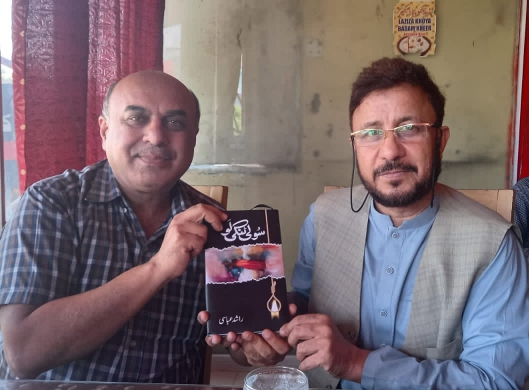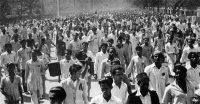
The language legacy
By: Naseer Memon
The language legacy
By: Naseer Memon

Skirmishes intensified and at around 3:30 pm, the police resorted to firing. Two young men, Abdul Jabbar and Rafiuddin Ahmed, were killed on the spot and Abdul Barkat succumbed to wounds in hospital on the same evening.
Brutal killings triggered incendiary reaction and on the morning of the 22nd, the building of The Morning News was set on fire and its press destroyed. Abul Kalam Shamsuddin, editor of the influential newspaper Daily Azad, as a protest against the shooting, resigned from the Muslim League Parliamentary Party. His newspaper rescinded its pro-Muslim League policy and carried black-bordered coverage of the killings. The students erected a monument called Shaheed Minar near the gate of the Medical College as a mark of respect for the Language Martyrs. According to the government reports, 9 persons were killed in the police shooting. The Language Committee claimed 39 killed and many injured.
The movement got a shot in the arm when Fazlul Haq resigned from the Advocate General’s position to organise the opposition against the Muslim League. The hatred for the central government and the Muslim League culminated in the startling result of election in March 1954. The Awami League took the lead to form a pan-Bengali political alliance. The alliance was termed the Jukta Front or United Front and formulated the 21-point Charter, to fight the Muslim League.
The United Front earned a landslide victory with 228 out of 237 Muslim seats trouncing the Muslin League that lost the grace and eked out only 10 seats in house of 309. Bengali was made national language along with Urdu as a retrofit in 1956 constitution but the damage was already done. Bengali language movement thus shaped the inexorable Bengali nationalism that eventually carved out Bangladesh.
The language legacy
By: Naseer Memon
Skirmishes intensified and at around 3:30 pm, the police resorted to firing. Two young men, Abdul Jabbar and Rafiuddin Ahmed, were killed on the spot and Abdul Barkat succumbed to wounds in hospital on the same evening.
Brutal killings triggered incendiary reaction and on the morning of the 22nd, the building of The Morning News was set on fire and its press destroyed. Abul Kalam Shamsuddin, editor of the influential newspaper Daily Azad, as a protest against the shooting, resigned from the Muslim League Parliamentary Party. His newspaper rescinded its pro-Muslim League policy and carried black-bordered coverage of the killings. The students erected a monument called Shaheed Minar near the gate of the Medical College as a mark of respect for the Language Martyrs. According to the government reports, 9 persons were killed in the police shooting. The Language Committee claimed 39 killed and many injured.
The movement got a shot in the arm when Fazlul Haq resigned from the Advocate General’s position to organise the opposition against the Muslim League. The hatred for the central government and the Muslim League culminated in the startling result of election in March 1954. The Awami League took the lead to form a pan-Bengali political alliance. The alliance was termed the Jukta Front or United Front and formulated the 21-point Charter, to fight the Muslim League.
The United Front earned a landslide victory with 228 out of 237 Muslim seats trouncing the Muslin League that lost the grace and eked out only 10 seats in house of 309. Bengali was made national language along with Urdu as a retrofit in 1956 constitution but the damage was already done. Bengali language movement thus shaped the inexorable Bengali nationalism that eventually carved out Bangladesh.
"With Thanks "The News


